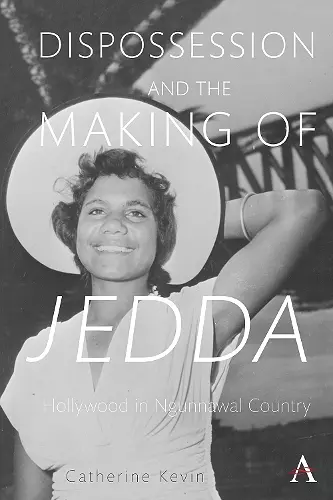Dispossession and the Making of Jedda
Hollywood in Ngunnawal Country
Format:Hardback
Publisher:Anthem Press
Published:31st Aug '20
Currently unavailable, and unfortunately no date known when it will be back

A personal account of coming to terms with a history of dispossession and colonial power relations
'Dispossession and the Making of Jedda (1955)' newly locates the story of the genesis of the iconic 1955 film ‘Jedda’ (dir. Chauvel) and, in turn, ‘Jedda’ becomes a cultural context and point of reference for the history of race relations it tells. It spans the period 1930–1960 but is focused on the 1950s, the decade when Charles Chauvel looked to the ample resources of his friends in the rich pastoral Ngunnawal country of the Yass Valley to make his film. This book has four locations. The homesteads of the wealthy graziers in the Yass Valley and the Hollywood Mission in Yass town are its primary sites. Also relevant are the Sydney of the cultural and moneyed elites, and the Northern Territory where ‘Jedda’ was made. Its narrative weaves together stories of race relations at these four sites, illuminating the film’s motifs as they are played out in the Yass Valley, against a backdrop of Sydney and looking North towards the Territory. It is a reflection on family history and the ways in which the intricacies of race relations can be revealed and concealed by family memory, identity and myth-making. The story of the author, as the great granddaughter, great-niece and cousin of some of those who poured resources into the film, both disrupts and elaborates previously ingrained versions of her family history.
"This book makes a vital and important contribution to the study of colonialism in Australia and should be considered an indispensable text for scholars in Indigenous Studies, History, Film Studies and Cultural Studies. Its accessible analysis of Jedda makes it an excellent teaching resource for undergraduate and postgraduate courses, especially in Australian Film Studies. — Camille Nurka, Independent scholar, Australian Historical Studies"
This book brilliantly evokes two intersecting histories – the making of Jedda, a remarkable film set in Australia’s north, and the nature of race relations in faraway Ngunnawal country, where those who financed Jedda made their fortunes. In its intimate exploration of the legacies and paradoxes of settler colonialism, it illuminates not only the times it portrays but also our own. — Ann Curthoys, professor emerita, Australian National University
A remarkable and unexpected story. In Catherine Kevin’s telling, Jedda becomes much more than a landmark in Australian film history. The book also brings together the history of her own settler family, who were members of the pastoral elite that financed Jedda, and the larger history of what Whites did to Indigenous people in taking possession of the continent. Jedda is a tragic tale of the spectacular remote outback, but it is also entangled in surprising ways with the dispossession and marginalisation of Aboriginal people in country much closer to the places most white Australians call home. — Frank Bongiorno, professor of history, Australian National University
This engaging book offers a new approach to an iconic Australian film. It narrates the untold histories of both the Yass Valley graziers who financed the film and the Ngunnawal people whose lives uncannily paralleled the colonial and assimilationist themes Jedda explored. Intimate and searching in the questions that it asks, this thoughtful study reveals the complexities of family memory which can both illuminate and suppress uncomfortable histories. — Shino Konishi, senior lecturer, Centre for Western Australian History, University of Western Australia
This is a significant book because it reveals aspects of Australian history that have been hitherto hidden in the memories of descendants of settler-colonial families. The story herein is a remarkable convergence of not only a cast of very notable names from both the Aboriginal community and settler-colonial grazier families but also one of the most important characters in early Australian cinema history, Charles Chauvel. An amazing tale, well written and a good read. — Gary Foley, Professor of History, Moondani Balluk, Victoria University
"In Dispossession and the Making of Jedda, Catherine Kevin offers a quietly compelling account of a paradox that defined settler colonialism in mid-20th century Australia: its fascination with Aboriginality at a distance—on screen and in the scenic centre and north of Australia—alongside its inability to see the ongoing dispossession of Aboriginal people close to home. At the heart of Kevin’s narrative is the glaring disparity she discovered between the taken-for-granted relations of Yass Valley woolgrowers with the Ngunnawal people (who worked in their homes) and the “colonial nostalgia” that drew these same woolgrowers to participate in the adventure of making Jedda. — Felicity Collins, La Trobe University, Journal of Australian Studies, https://doi.org/10.1080/14443058.2020.1836740"
In Dispossession and the Making of Jedda, Catherine Kevin offers a quietly compelling account of a paradox that defined settler colonialism in mid-20th century Australia: its fascination with Aboriginality at a distance—on screen and in the scenic centre and north of Australia—alongside its inability to see (let alone comprehend) the ongoing dispossession of Aboriginal people close to home. — Felicity Collins (2020) Dispossession and the Making of Jedda, Journal of Australian Studies, DOI: 10.1080/14443058.2020.1836740
ISBN: 9781785273506
Dimensions: 229mm x 153mm x 26mm
Weight: 454g
130 pages